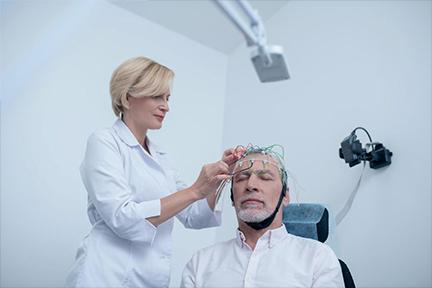
Transcranial Magnetic Stimulation (TMS) therapy is gaining attention in Los Angeles as a promising alternative for seniors dealing with depression. Many individuals in this demographic are seeking options that minimize the use of medications due to potential side effects and interactions with other treatments. TMS offers a non-invasive and medication-free approach, making it appealing to those who prefer a drug-free solution.
The rise in treatment-resistant depression among seniors poses a significant challenge. Traditional medications often come with the burden of side effects, particularly in older adults who may be managing multiple health conditions. By providing a different path from pharmaceuticals, TMS therapy appeals to those searching for effective treatment without additional medication risks.
In Los Angeles, numerous seniors are turning to TMS to find relief from depressive symptoms. By utilizing magnetic fields to stimulate specific areas of the brain, TMS therapy highlights its effectiveness without the need for drugs. This treatment has emerged as a solution that not only addresses their mental health needs but also preserves their overall well-being.
Understanding TMS Therapy and Its Advantage for Seniors
Transcranial Magnetic Stimulation (TMS) Therapy stands out as a promising non-invasive treatment for depression, particularly beneficial for seniors who seek an alternative to traditional medications. This section investigates the method and its advantages over conventional drug therapies.
The Fundamentals of TMS Therapy
TMS Therapy employs magnetic pulses to stimulate neural activity in the brain's prefrontal cortex, which plays a crucial role in regulating mood. This outpatient procedure requires no anesthesia or surgery, making it a safe option for individuals, especially older adults, who may be concerned about the invasiveness of other treatments. Through effective stimulation, TMS targets the areas associated with depression, offering a new approach for those with treatment-resistant depression.
The effectiveness of TMS is supported by its ability to adjust the levels of neurotransmitters, aiding individuals with major depressive disorder (MDD) to achieve sustained improvement. Many patients experience lasting relief from depression symptoms after a series of sessions, and the side effects of TMS are typically minor, such as mild scalp discomfort. Deep TMS, a variant of this method, is also available and can provide targeted treatment for deeper brain regions, enhancing its effectiveness.
Why TMS is a Preferred Option Over Medication for Seniors
For seniors, TMS offers an appealing drug-free treatment option, eliminating concerns about drug interactions, side effects, or dependency often associated with antidepressants. Medications can pose significant challenges for older adults, including adverse reactions and reduced efficacy over time. TMS Therapy, on the other hand, bypasses these issues with a mechanism of action that directly influences brain function.
Insurance coverage for TMS has improved, making it more accessible to a broader demographic. The treatment has a favorable safety profile and can lead to remission in cases of major depressive disorder. For seniors with treatment-resistant depression, the non-invasive nature of TMS ensures it is both a sensible and convenient choice, often leading to lasting improvements without the complications linked to medication.
Comparing TMS to Traditional Medication Treatments
Transcranial Magnetic Stimulation (TMS) and traditional medication treatments both offer unique approaches to addressing depression. TMS uses magnetic fields to stimulate brain regions, while medications often rely on chemical adjustments within the brain. This comparison explores some of the challenges associated with antidepressants and highlights differences in success and remission rates between TMS and medication.
The Challenges of Antidepressant Medication
Antidepressant medications, including Selective Serotonin Reuptake Inhibitors (SSRIs) and Tricyclic Antidepressants (TCAs), are widely used in treating depression. Despite their popularity, they are not without challenges. Common side effects include insomnia, sexual dysfunction, and nausea. Patients may also experience weight gain and dizziness. These side effects can affect willingness to continue treatment, impacting overall effectiveness.
In addition to side effects, antidepressants often require several weeks to show noticeable improvements. The slow onset can be frustrating for individuals seeking immediate relief from depressive symptoms. Moreover, finding the optimal medication or dosage may involve a prolonged period of trial and error. This process can be daunting and discouraging for many patients.
Success Rates and Remission in TMS vs. Medication
TMS treatment stands out as a non-invasive therapy with fewer reported side effects compared to antidepressants. Studies indicate that TMS has demonstrated high success rates, particularly in patients with treatment-resistant depression. While medications can be effective, they may not always lead to complete remission, leaving a gap in achieving full mood regulation.
In contrast, TMS often provides faster improvements, with some patients noticing changes within weeks. Compared to medications, TMS has been shown to significantly enhance remission rates. This makes it a compelling option for those who have not found sufficient relief through traditional treatments such as medications or Electroconvulsive Therapy (ECT). TMS's role as a non-pharmaceutical alternative offers a valuable choice in the landscape of mental health treatment.
Disclaimer:
The information provided in this article is for educational and informational purposes only and should not be construed as medical advice. Transcranial Magnetic Stimulation (TMS) therapy is a medical procedure that requires a prescription and supervision by a licensed healthcare professional. Individual results may vary, and TMS therapy may not be suitable for everyone.
Before considering TMS therapy, consult a qualified medical provider to evaluate whether it is appropriate for your specific condition and circumstances. The content in this article does not substitute for professional diagnosis, treatment, or medical advice. Always follow the guidance of your healthcare provider and discuss any questions or concerns about TMS therapy or alternative treatments with them.
This article does not guarantee any particular outcome and is not liable for any actions taken based on the information presented. If you are experiencing a medical emergency or severe mental health crisis, please contact emergency services or a crisis hotline immediately.
